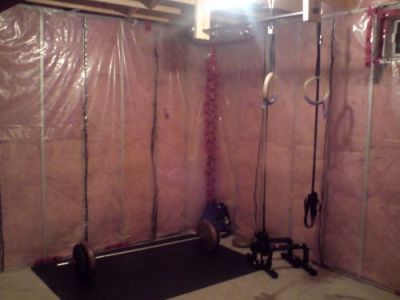There’s an old joke that goes something like this: a man walks into a bar and asks the bartender why his head hurts. The bartender responds, well you just walked into a bar.
Ok - not a real joke - I just made that one up (as if you couldn’t tell). But let me now segue into the premise of this post. That is, the pull-up bar.
Next to some floor space and a barbell, in my opinion, the pull-up bar is the next most important item on any home gym builder’s shopping list. What kind of bar to get and how much one should spend, however, is a little tricky.
Let’s first look at why a pull-up bar is so super good to have at your disposal:
- Pull-ups are entirely functional, natural movements. Think about it for a sec - the ability to pull is fundamental to our existence. Our bodies were made to climb and I can guarantee you that at some point throughout your genealogical history, one of your ancestors was in a life or death situation, having to pull themselves up over a ledge or something. Fortunately for you, they were able to do it.
- Pull-ups work a broad range of muscle, from shoulders, traps, biceps, triceps, forearm, grip and all sorts of core. Add kipping and intensity to your pull-ups, do more work in less time, and you’ve suddenly got a strength workout combined with a fierceness that tests both the anaerobic and aerobic systems and can leave you gasping for air.
- A pull-up has many variations and progressions, from jumping pull-ups to L-Sit pull-ups and muscle-ups, there’s a variation that is accessible to all - even the weakest of us and the exercise can always provide additional challenges for the strong.
These were just a few of the reasons why pull-ups second to few exercises and the pull-up bar should be added to the top of your list of “to get” items for your home gym.
Now, what kind should you get? There’s those bars that can be squeezed between a door frame and others that hang on the top of the frame. The former is likely a waste of money and the latter is not very versatile and is likely costlier than the best pull-up bar in the biz - yes, I’m talking about a cheap, homemade pull-up bar.
When I say cheap, I’m talking about a low cost versus cheap as in my car fell apart after 3 days use cheap.
The biggest problem with many store bought pull-up bars is that you can’t kip on them. While some of you may say, I don’t need to kip, true, you don’t - in fact, you don’t need to do anything. But I’d have to add, if you want to get strong, you’d be far better off if you did or at least did most of the time. I won’t get into why (beyond what I have said already), but here’s a great discussion of kipping versus not kipping. If you don’t know what kipping is, watch this.
The next biggest problem with store bought bars is the cost. You’re looking at at least $30 for the better of the kinds of consumer bars. What you can build at home can cost as little as $20 and half an hour of your time. The results, however, is a pull-up bar that can hold multiple people and allow you to kip and do clappers (if you ever could do clappers in the first place, that is).
What you need:
- 2 exposed joists
- 2 18 inch 2×6 boards
- 6 carriage bolts, nuts and washers
- a 3/4 inch pipe
- A drill with a 3/4 inch bit
See the pic above. Drill out 3/4 inch holes about an inch off the ends of the 18 inch 2×6’s. Clamp them to the joists and drill out holes for the carriage bolts. Unclamp the boards from the joists and bang each end of your pipe through the 3/4 inch holes (note that I’ve used a inch hole in my own to get the pipe through easier. Best to get caps for the pipe though to make sure it doesn’t fall out while performing pull-ups though). Bolt the contraption to the joists where you previously drilled.
Done. Easy peasy… Now let’s taker ‘er for a ride…
3 Comments | In: crossfit, exercise, pull-up bar, pullup, strength | tags: homemade pull-up bar, homemade pullup bar, pull-up, pull-up bar, pullup bar. | #
 Gyminee, on the other hand, seems to be a bit more mature of a website, probably due to it’s relatively longer existence. Gyminee offers much of the same as FitFiend but also includes food tracking, challenges, detailed workout programs, iPhone support and a PRO version, among other things. From a design perspective, Gyminee is stunning, in comparison to FitFiend. Again - this is likely a result of the maturity of the application.
Gyminee, on the other hand, seems to be a bit more mature of a website, probably due to it’s relatively longer existence. Gyminee offers much of the same as FitFiend but also includes food tracking, challenges, detailed workout programs, iPhone support and a PRO version, among other things. From a design perspective, Gyminee is stunning, in comparison to FitFiend. Again - this is likely a result of the maturity of the application.



